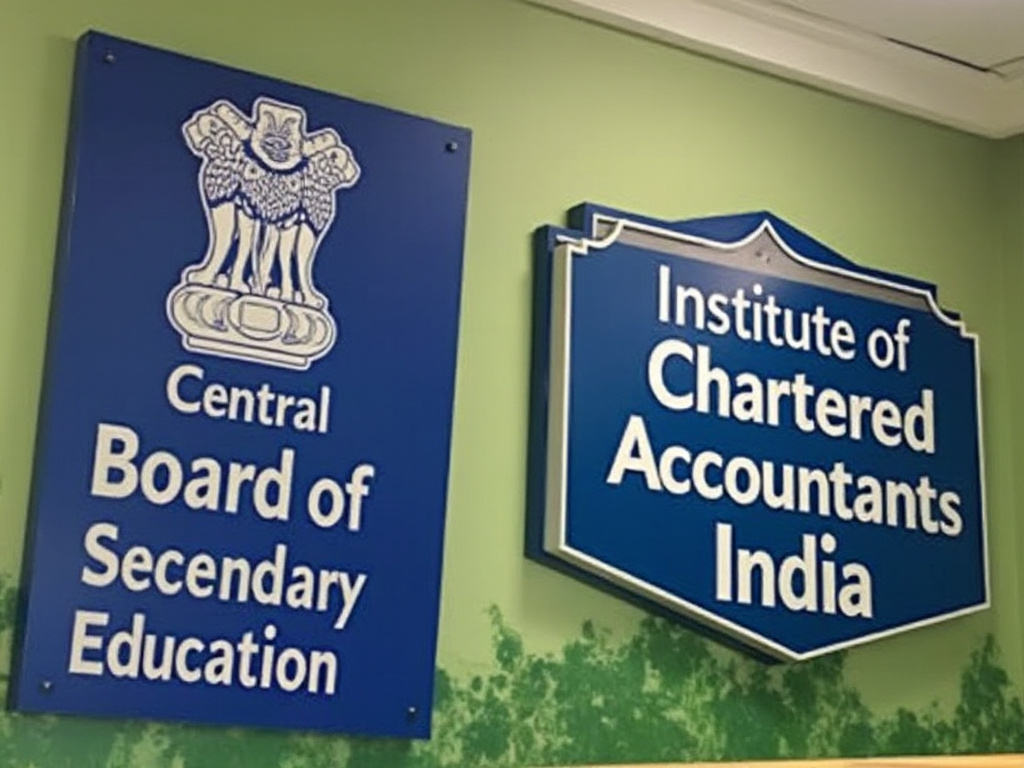CBSE and ICAI Join Hands to Enhance Financial Literacy and Accounting Education

The Central Board of Secondary Education (CBSE) and the Institute of Chartered Accountants of India (ICAI) have entered into a landmark agreement aimed at promoting financial literacy and accounting education among school students. This collaboration is set to revolutionize the way financial education is imparted at the school level, equipping students with essential skills for their future careers.
Objectives of the Agreement
The primary objectives of the agreement between CBSE and ICAI are:
- Enhancing Financial Literacy: Introducing financial literacy as a core component of the school curriculum to ensure students understand the basics of finance, budgeting, and investment.
- Promoting Accounting Education: Integrating accounting education into the school syllabus, providing students with a foundational understanding of accounting principles and practices.
- Professional Development: Creating pathways for students to pursue careers in accounting and finance by providing them with the necessary knowledge and skills.
- Capacity Building: Training teachers and educators in financial literacy and accounting, enabling them to effectively teach these subjects to students.
Key Components of the Agreement
The agreement includes several key components aimed at achieving the aforementioned objectives:
Curriculum Development
- Integration of Financial Literacy: Financial literacy modules will be integrated into the existing curriculum for classes 6 to 12, covering topics such as personal finance, budgeting, savings, investments, and financial planning.
- Introduction of Accounting Subjects: Accounting subjects will be introduced at the senior secondary level (classes 11 and 12), covering fundamental accounting concepts, financial statements, bookkeeping, and auditing.
Teacher Training
- Capacity Building Programs: ICAI will conduct capacity-building programs for CBSE teachers, focusing on financial literacy and accounting education through workshops, seminars, and online courses.
- Certification for Teachers: Teachers who complete the training programs will receive certification from ICAI, recognizing their expertise in financial literacy and accounting education.
Student Engagement
- Workshops and Seminars: Regular workshops and seminars will be organized for students to enhance their understanding of financial literacy and accounting, featuring experts from the field of finance and accounting.
- Competitions and Contests: Financial literacy and accounting competitions will be held at the school, district, and national levels to encourage student participation and engagement.
Resource Development
- Educational Materials: ICAI will develop and provide educational materials, including textbooks, workbooks, and online resources, to support the teaching of financial literacy and accounting in schools.
- Digital Platforms: A dedicated digital platform will be created to provide students and teachers with access to online courses, tutorials, and interactive learning tools.
Benefits of the Agreement
The agreement between CBSE and ICAI is expected to yield several benefits for students, teachers, and the education system as a whole:
For Students
- Enhanced Financial Literacy: Students will gain a better understanding of financial concepts, enabling them to make informed financial decisions in their personal and professional lives.
- Career Opportunities: Exposure to accounting education will open up new career opportunities for students in the fields of finance, accounting, and business.
- Practical Skills: Students will acquire practical skills in budgeting, financial planning, and investment, which are essential for managing personal finances.
For Teachers
- Professional Development: Teachers will receive specialized training in financial literacy and accounting, enhancing their professional skills and knowledge.
- Certification: Certified teachers will be recognized for their expertise, which can lead to career advancement and opportunities for further professional development.
For the Education System
- Improved Curriculum: The integration of financial literacy and accounting into the school curriculum will improve the overall quality of education, making it more relevant to the needs of the modern world.
- Capacity Building: The training programs for teachers will build capacity within the education system, ensuring that financial literacy and accounting are taught effectively.
Implementation Strategy
The successful implementation of the agreement between CBSE and ICAI will require a well-defined strategy, including the following steps:
Phase 1: Planning and Development
- Needs Assessment: Conduct a needs assessment to identify the specific requirements of schools, teachers, and students in terms of financial literacy and accounting education.
- Curriculum Design: Develop a comprehensive curriculum for financial literacy and accounting, in collaboration with subject matter experts and educators.
- Resource Development: Create educational materials and digital resources to support the new curriculum.
Phase 2: Teacher Training
- Training Programs: Organize training programs for teachers, focusing on the new curriculum and teaching methodologies for financial literacy and accounting.
- Certification: Implement a certification process for teachers who complete the training programs.
Phase 3: Curriculum Integration
- Pilot Programs: Launch pilot programs in select schools to test the new curriculum and gather feedback from teachers and students.
- Full-Scale Implementation: Roll out the new curriculum across all CBSE-affiliated schools, based on the feedback from the pilot programs.
Phase 4: Monitoring and Evaluation
- Continuous Monitoring: Monitor the implementation of the new curriculum and training programs to ensure their effectiveness.
- Evaluation and Feedback: Conduct regular evaluations to assess the impact of the new curriculum on student learning outcomes and gather feedback from teachers and students for continuous improvement.
Challenges and Solutions
The implementation of the agreement between CBSE and ICAI may face several challenges, including:
Resistance to Change
- Solution: Conduct awareness campaigns to highlight the importance of financial literacy and accounting education, and engage stakeholders in the planning and implementation process.
Resource Constraints
- Solution: Leverage digital platforms and online resources to provide cost-effective educational materials and training programs.
Teacher Training
- Solution: Develop flexible training programs that can be delivered online or in-person, and provide ongoing support to teachers through mentorship and professional development opportunities.
Conclusion
The agreement between CBSE and ICAI represents a significant step towards enhancing the quality of education in India. By integrating financial literacy and accounting education into the school curriculum, this collaboration will equip students with essential skills for their future careers and personal lives. The successful implementation of this agreement will require the collective efforts of educators, policymakers, and stakeholders, but the potential benefits for students, teachers, and the education system as a whole are immense.
This comprehensive approach to financial literacy and accounting education will not only prepare students for the challenges of the modern financial world but also contribute to the overall development of a financially literate and responsible society.
